基于单片机的水情检测系统设计(附仿真程序)(任务书,开题报告,外文翻译,论文11200字,仿真程序)
摘 要
水是生命之源,地球表面积的百分之七十一是水,哪里有水哪里就会有生命,人的生命离不开水,工农业的发展也离不开水,因而水对于人类来说至关重要,然而随着经济的快速发展,生活用水和工农业用水都逐渐增多,暴雨泥石流等自然灾害也时有发生,人类的可持续发展正面临着严峻的挑战。我们要重视对水的研究,先通过水情检测器知水而后合理用水。我国幅员辽阔,大部分区域位于亚洲季风区,降水相对集中,河流水量变化比较剧烈,因而水情检测对我们来说是关乎民生的大事,不可小觑。
本文以PROTEUS软件作为仿真环境,以AT89C52单片机为核心,以一些相应的硬件电路作为外围功能电路,设计了一个能实时检测水情的装置,实现实时测量水位数据、水温数据、PH值等功能。外围主要由超声波传感器、PH传感器、温度传感器、A/D模块、单片机、显示模块、报警模块等组成。在硬件电路上在,通过传感器收集到的水位、PH值数据发送到单片机,温度传感器测得水温可以为超声波测距和PH值采集提供温度补偿校正,单片机存储实时数据,并显示在LCD液晶屏上,当水位值或PH值不在规定范围内,单片机发送信号给报警模块,系统会自动报警。在软件程序方面,设计采用的是C语言来编写相应的程序。通过软件程序和硬件电路的结合匹配实现对水情检测系统的水情数据的采集、显示和检测。
关键词:水情检测器;单片机;C语言;PROTEUS仿真
ABSTRACT
Water is the source of life. Seventy-one percent of the Earth’s surface is water. Wherever there is water, there will be life. Human life cannot be separated from water. The development of industry and agriculture is also inseparable from water, so water is important for humans. However, with economic development faster, domestic water, the user of industrial and agricultural water has gradually increased, and natural disasters such as heavy rain, mudslides and other natural disasters have also occurred from time to time. Human sustainable development is facing severe challenges. We must pay attention to the study of water. First we should know the water through the water condition detector and then use it rationally. China has a vast area, most of which are located in the Asian monsoon region. Precipitation is relatively concentrated, and the river water volume changes drastically. Therefore, the detection of water conditions is a matter of great importance to people's livelihood and cannot be overlooked.
This paper takes PROTEUS software as the simulation environment, takes AT89C52 as the core, uses some corresponding hardware circuits as the peripheral functional circuit, designs a device that can detect the water condition in real time, and realizes real-time measurement of water level data, water temperature data, and PH value. The periphery is mainly composed of an ultrasonic sensor, a PH sensor, a temperature sensor, an AD module, a single-chip microcomputer, a display module, and an alarm module. On the hardware circuit, the water level and PH value data collected by the sensor are sent to the SCM. The water temperature measured by the temperature sensor can provide temperature compensation correction for ultrasonic ranging and PH value acquisition. The SCM stores real-time data and displays it on the LCD screen. Above, when the water level or pH value is not within the specified range, the single-chip sends a signal to the alarm module and the system will automatically alarm. In the software program, the design uses the C language to write the corresponding program. Through the combination of software programs and hardware circuits, the collection, display and detection of the water regime data of the water regime detection system are realized.
Keywords: water detector;single-chip;C language;PROTEUS simulation
论文的主要工作
(1)设计一种水情检测器,这种水情检测器的控制核心是单片机,采集模块包括温度测量模块、超声波测量水位模块、PH值测量模块,同时系统还有数据显示模块、报警模块、按键模块;
(2)这个水情检测装置能够实时测量水位、水温和水的pH值,并通过LCD液晶屏进行数据显示;
(3)当测量得到的水位值或PH值不在设定范围内,系统会自动执行声光报警。
系统总体设计
此次设计的水情检测系统需要测量的数据:水位、温度、PH值;测量得到的数据通过LCD液晶屏进行显示;同时整个系统要有报警装置。系统总体的设计思路就是分模块进行设计,大致分为以下几个模块:
(1)单片机模块的设计:根据功能要求以及运行速度内存等因素进行单片机选型。
(2)水位测量模块的设计:根据实际要求采用超声波传感器测量实时水位,采用时间差测距法测出超声波从发射到到接受到反射波的时间t,根据公式 测得水位.
(3)PH值测量模块的设计:采用符合功能要求设计精度的PH传感器。
(4)温度测量模块设计:根据设计要求采用合适的温度传感器,测出水温同时为水位和PH的测量提供温度补偿所需相关数据。
(5)LCD显示模块设计:根据需要显示的内容和数据的大小选择合适的LCD。
(6)报警模块设计
(7)A/D转换模块的设计:为传感器测得的信息与单片机进行传输提供信号类型转换。
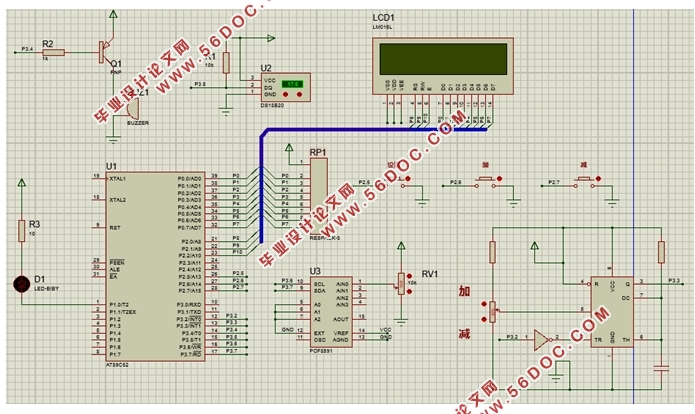
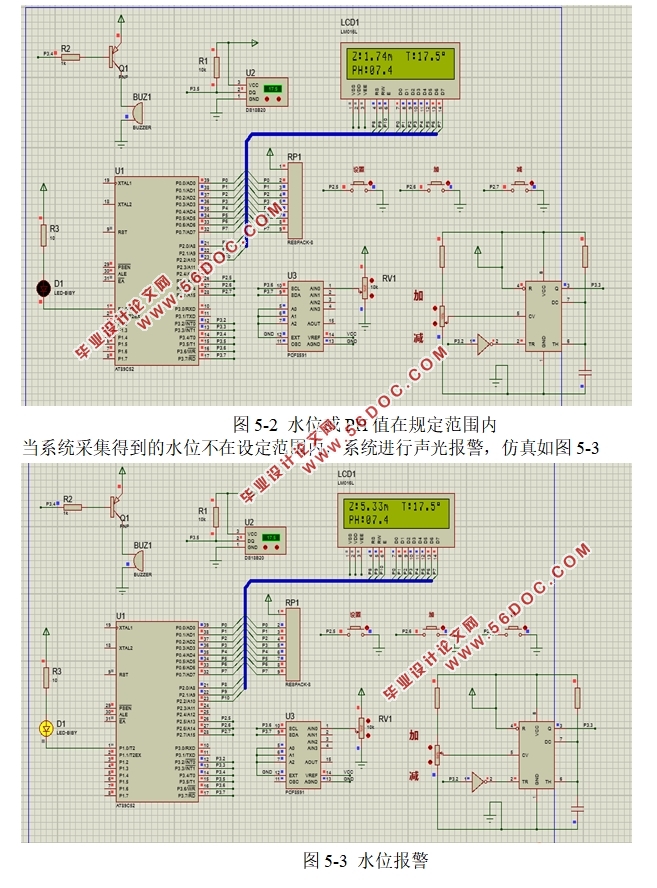
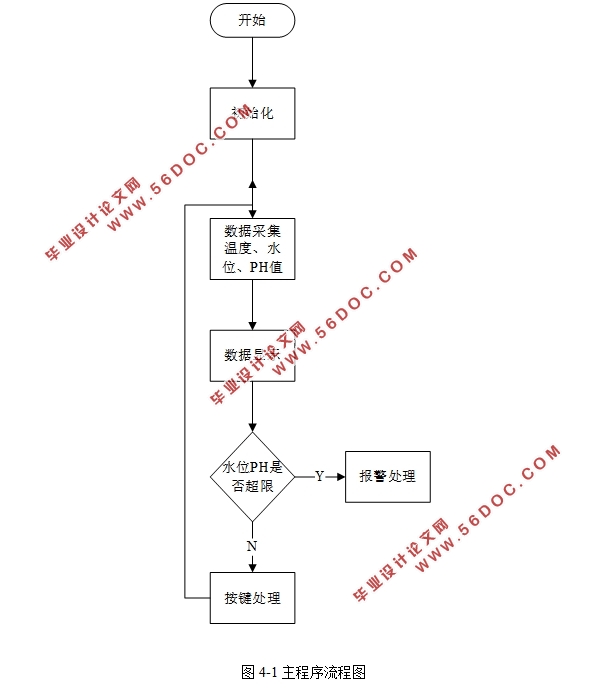
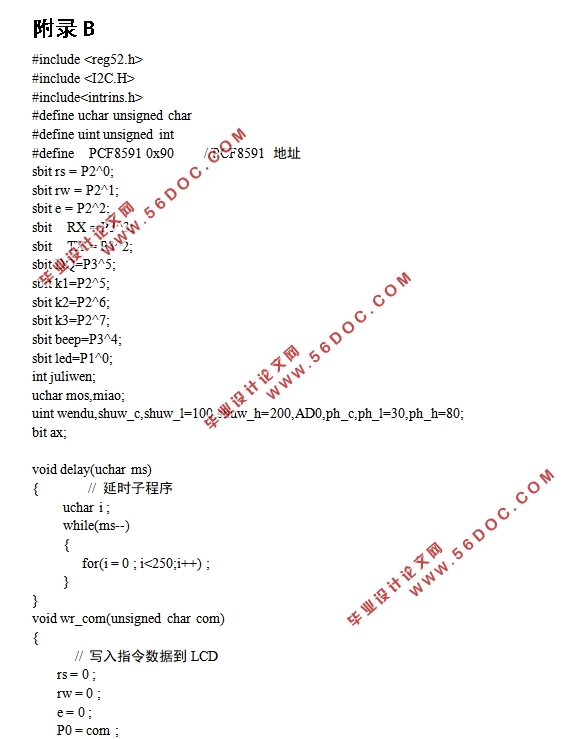
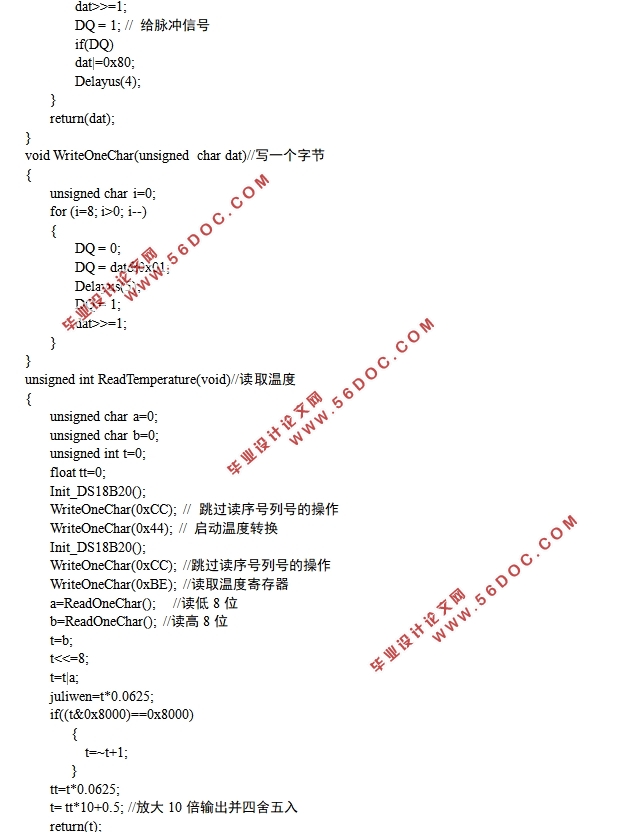
目 录
第1章 绪论 1
1.1论文的研究背景及意义 1
1.2国内外的发展现状 2
1.3论文的主要工作 2
第2章 系统总体设计 3
第3章 系统硬件设计 4
3.1传感器选型 4
3.1.1超声波传感器 4
3.1.2 PH传感器 5
3.1.3温度传感器 7
3.2主控芯片 8
3.3采集电路 11
3.3.1超声波测距模块 11
3.3.2 PH测量模块 12
3.3.3温度测量模块 13
3.4数据显示接口电路 13
3.5报警电路 15
3.6按键模块 15
第4章 系统软件设计 16
4.1 主程序 16
4.2 子程序设计 17
4.2.1超声波模块程序设计 17
4.2.2温度测量模块 20
4.2.3 PH模块 23
4.2.4 显示模块 24
第5章 结论 27
致谢 30
参考文献 31
附录A 32
附录B 32
|











